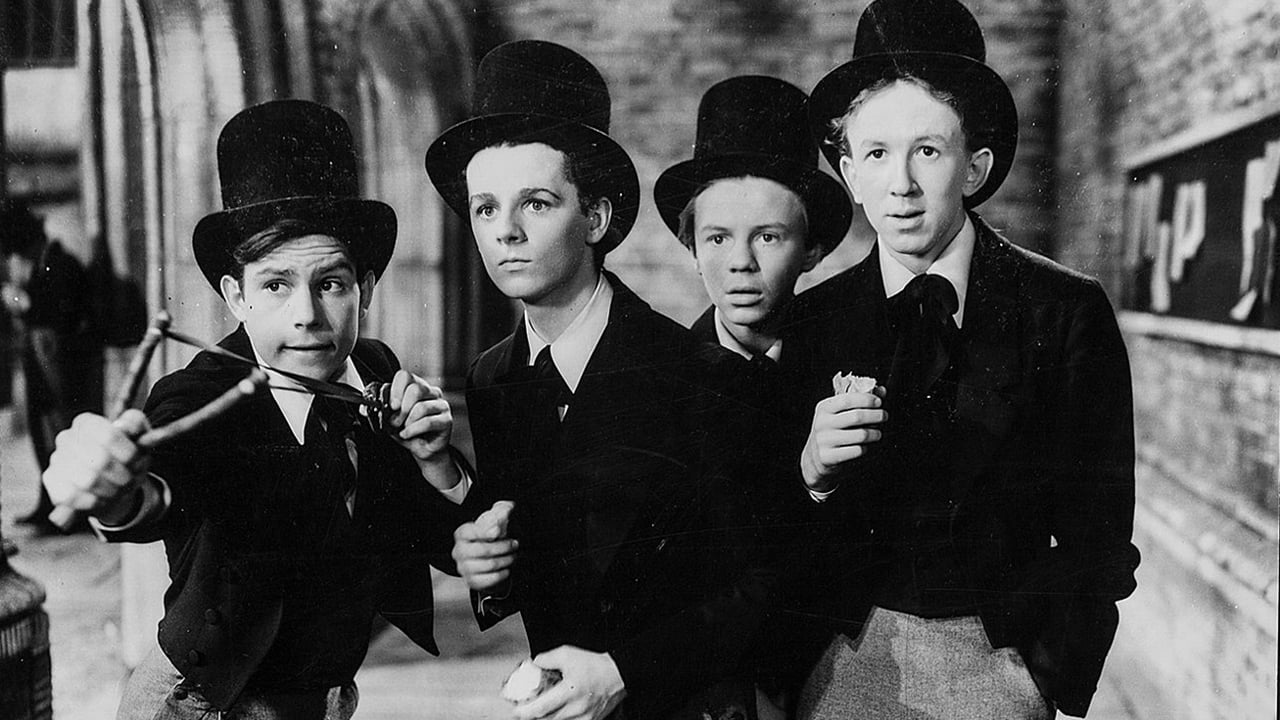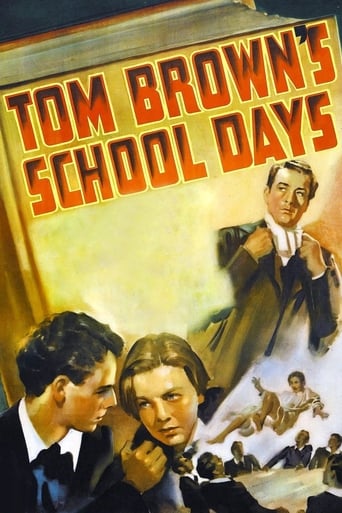

"Tom Brown's School Days": A novel? A memoir? An autobiography? I think the third is the best description of this schoolboy's time at Rugby, written by "an old boy". Thomas Hughes was not identified as the author of the book until around the time he was re-elected to the House of Commons in 1871. (He had been a member of parliament since 1864). By that time, Doctor Arnold was long dead, but his educational ideas persisted in the British education system until well into the 1960s. However, he is not a major character in the novel. Indeed, he is a somewhat shadowy figure, remote from Tom's immediate world. It was the 1916 movie version that elevated Arnold's importance, and following that lead, it is our 1940 version that virtually makes the influential educationalist the central character.However, I don't think that elevating Arnold's importance detracts from the movie. Far from it! As brilliantly brought to life by Sir Cedric Hardwicke, Arnold is indeed a fascinating, charismatic figure. Hardwicke is not only ideally cast, he rejoices in the best role of his extensive career, demonstrating how he can not only capture an audience's attention and sympathy, but how he can totally dominate the action if given the right script and director.Nevertheless, the supporting players, led by Billy Halop, also turn in outstanding performances. This was probably the only totally unsympathetic role Halop ever played, but he limns the character with a skill that simply rivets the attention. His is the definitive study of a swaggering bully. Of course, Jimmy Lydon never bettered his role as Tom Brown. Freddie Bartholomew is also solidly convincing as East, and there are fine studies from Polly Moran, Josephine Hutchinson, Ernest Cossart and Charles Smith (who was soon to prove Lydon's mainstay in the Aldrich movies).Adroitly directed by Robert Stevenson, and most expansively produced with marvelous sets and evocative photography, this version of Tom Brown's School Days is not only a really gripping, stirring experience, it's an absolute must-see movie – a credit to all concerned!
... View MoreIn 1842 England, Rugby School students Jimmy Lydon (as Tom Brown) and Freddie Bartholomew (as Harry East) meet, after the death of beloved headmaster Cedric Hardwicke (as Thomas Arnold). The lads agree to "be friends again" as Mr. Hardwicke would have wanted Then, in flashback, young Mr. Lydon recalls his education at Rugby, where he went to war with bullying Billy Halop (as Flashman) and his gang, ended his friendship with Mr. Bartholomew through misunderstanding, and watched as Hardwicke's Thomas Arnold (1795-1842) reform British education.This interpretation of Thomas Hughes' classic "Tom Brown's School Days" isn't the most faithful to the book; but it's close enough for Hollywood, and the tightening makes it a finer film. The RKO production team does great work. They found the perfect director by importing England's Robert Stevenson. And, Anthony Collins' musical score is outstanding (he received "Oscar" nominations 1940-1942). It also helps to have Sir Hardwicke head the school, as he registers a British headmaster you can use as a standard. As a bonus, debuting Gale Storm (as Effie) makes heads turn. The three youngsters are a nice surprise. Lydon handles his part exceptionally well; this could be his best juvenile lead. To great effect, they let Bartholomew act, and in a supporting role. And, Mr. Halop is a believable punk Brit. Coincidently, "Harry" is the first name given for the characters played by Bartholomew ("Harry East" in the original novel) and Halop ("Harry Flashman" in a spin-off series). So, it may be no wonder J.K. Rowling found it a perfect surname for "Happy Potter" of Hogwarts. By the way, this film will give you a sense of what those British Public Schools were like...******* Tom Brown's School Days (6/27/40) Robert Stevenson ~ Jimmy Lydon, Cedric Hardwicke, Freddie Bartholomew, Billy Halop
... View MoreThis is a film of a work of fiction written by Thomas Hughes in 1857 which featured the life of Thomas Arnold, headmaster of Rugby School from 1828 to 1842, and the name Hughes gave to the principal fictional character in his novel was Tom Brown. There appears to be some significance in this choice of name. Hughes himself attended Rugby school during the period of Dr Arnold's headmastership, this is why he was able to write about the school with such authority; so it appears to me that the character of Tom Brown (and perhaps the entire book) is probably semi-autobiographical - but, somewhat surprisingly, I have never seen this discussed elsewhere.There are many famous schools throughout the world which have modelled themselves, with greater or lesser success, on the British Public School, but collectively the British schools have one unique feature - they created an extremely successful method for perpetuating the rule of the established oligarchy in the U.K. over a period of several centuries when the country was the most powerful in the world. In the U.K. Public Schools are private foundations theoretically open to all, but their high fees meant that education was largely limited to the sons of members of the ruling class, and a Public School education became almost a pre-requisite for admission to a University, election to Parliament or recruitment to any senior government position. It is surprising that, despite this, the Public Schools have always been able to keep a fairly low profile although it is clear that they must have considerable importance both sociologically and historically. Most Englishmen can think of several of the leading Public Schools such as Eton, Harrow, Rugby and Shrewsbury, but few know much about them. Almost the only widely read book dealing with the subject has been "Tom Brown's School Days" the book written by Thomas Hughes on which this film is based. It is a fictional work dealing with the reform of the public school system which started in Rugby under Thomas Arnold, its great headmaster from 1828 to 1842. This was a time when abuses had crept into the system and were beginning to discredit it. At Rugby, Arnold largely stamped out excessive bullying and helped establish ethical standards under which telling tales about fellow students or uttering any untruths became totally unacceptable behaviour. During the process Rugby, which had been a fairly minor Public School, became the leading one in the country. This is the background to Hughes' book, and it also forms an integral part of this film, as well as a remake of it that was released a decade later. Both films were made more than a half century ago but have remained of sufficient interest to justify them retaining ongoing availability on videotape. Nevertheless today this ongoing interest probably arises primarily from readers who have enjoyed the book, former students at one of these schools, educationalists or sociological historians, so today sales of these tapes are probably small and I would guess that we are unlikely to see either film on DVD in the near future. Although the two films are well made, with well acted stories that most people can watch with enjoyment, their unfamiliar scenario would make it unlikely that many of today's movie patrons would make any effort to search them out and this makes rating them a little difficult. PARTIAL SPOILER FOLLOWS - The book relates how Tom Brown goes to Rugby as a new boy and falls victim to the older bully Flashman. Eventually he obtains boxing training and successfully fights Flashman to establish his place in the sun. When Flashman contravenes the unwritten school ethical code Arnold takes the opportunity to expel him and, by the time Tom graduates, the headmaster, together with other boys like him, have succeeded in transforming the old atmosphere in the school. The story in the book is followed fairly closely by this film, which was made in 1940 with the famous and very prolific actor Sir Cedric Hardwicke giving a great performance as the headmaster. Unfortunately, in the U.K. 1940 was the darkest period of World War II and films released then did not attract a great deal of attention, so the film was remade only a decade later with a different cast who also gave a number of very fine performances, and it was spiced up with a much more melodramatic screenplay in which Flashman is not merely a bully but exhibits behaviour verging on the criminal. Since both films provide good meaty stories which most viewers should enjoy, this is one of the rare cases where both an original film and its remake are still worth watching. However for my money I prefer this 1940 film because it is more faithful to the book on which it is based, and (although we can no longer ask anyone what life in the school was actually like in the early nineteenth century) in my opinion is probably much closer to the actual historical story. Primarily because of its somewhat limited appeal I do not think rating this film at more than 6 out of 10 would be justified, but it certainly remains well worth watching by anyone of any nationality with an interest in education.
... View MoreThis work is primarily occupied with the major incidents in the life of Thomas Arnold, headmaster of Rugby, and his overcoming of a good deal of resistance in lifting that institution from a tepid state to a position of England's finest public school. The strong direction is by Robert Stevenson, who also contributed mightily to the script, which is rather faithfully based upon the novel of the same name by Thomas Hughes, and which employs the student Tom Brown as Arnold's tactical and ethical surrogate within the scholastic body. Arnold, who must find an answer to the prevalent bullying of the day, is portrayed by Sir Cedric Hardwicke with a stunning performance, ably supported by Josephine Hutchinson as Mrs. Arnold. The film proceeds at a very crisp pace, with the scenario building well as Brown, played with feeling by Jimmy Lydon, prepares to make a stand against older and tyrannical students led by Billy Halop as Flashman. The arteries of the novel are presented with some depth, demonstrating the inculcation into the students of the importance of physical and mental courage, loyalty, and self-reliance, albeit apparently at the cost of some amount of intellectual achievement. The love of the students for Rugby and for their headmaster is presented throughout, the production design, costumes, and editing are all first-rate, and a superb musical score is contributed by Anthony Collins.
... View More